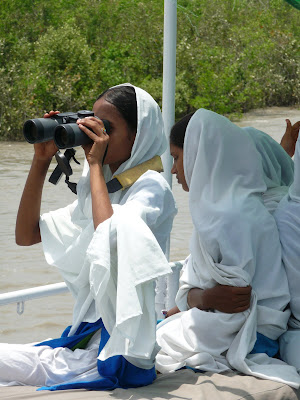

Today was the final day of our creative writing workshop in Chandpai. We presented the top three students in each of the two classes with a chicken as a reward for their efforts! There was a lot of giggling and laughing about the chickens. One students really loved getting his chicken, but I am not so sure what the girls thought! Overall, we got some great stories about the Ganges River dolphins from this workshop and I continue to be impressed about how quickly kids around the world pick up on storytelling. It is hard leaving Chandpai behind since I spent so little time there. It is really a fascinating place, tucked away in the beautiful wilderness that is the Sundarban Forest. Life there isn't easy. I met a young boy (maybe 7 years old) who had spent all day pulling a net through the shallows to catch shrimp larvae. He was excited to have caught 6 freshwater and 6 saltwater shrimp (the brackish water of the Sundarbans supports both). For his full day of work, he will earn about 10 Taka, or roughly 15 cents. Yet the people of Chandpai have an easy way about them. Upon one of the student's houses, her father promptly climbed to the top of a coconut tree, collected a few coconuts, cut them open with his machete, and served us a few glasses of fresh coconut milk (which Nic knows is my favorite!). There is also an old woman and and old man who are both known as the "town beggars." The whole town takes turns taking care of them, making sure they have enough to survive. And that's coming from people who have to send their 7 year old children out to work all day to earn 15 cents. It was truly a pleasure to have the opportunity to meet the people of Chandpai!



